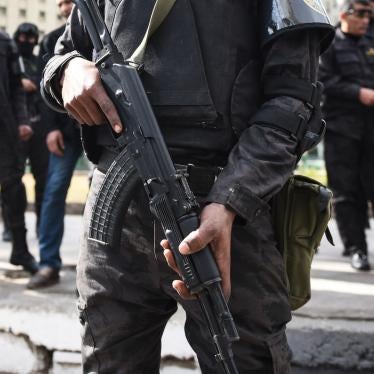"It's just an idea the president came up with," said one Pentagon official, who did not want to be identified, after President George W. Bush proposed to demolish Abu Ghraib prison in his speech at the US Army War College on May 24. The proposal was just about the only new idea in the president's speech, which repackaged what passes for administration policy in Iraq as a "five-step plan." Whatever one thinks of the president's overall Iraq policy, tearing down Abu Ghraib would be a terrible idea.
The proposal was just about the only new idea in the president's speech, which repackaged what passes for administration policy in Iraq as a "five-step plan." Whatever one thinks of the president's overall Iraq policy, tearing down Abu Ghraib would be a terrible idea. There may be good reasons to detain future Iraqi criminals and criminal suspects in some other penal institution, but Abu Ghraib, or at least some meaningful part of it, should be preserved, dedicated to the need for justice and accountability for all the atrocities committed there.
Today, of course, there is no way that could happen without also memorializing the crimes perpetrated by US forces inside the prison's walls, and the American policies that set them in motion. One suspects that this is precisely the president's aim - to erase the stain of Abu Ghraib that now includes torture perpetrated by US soldiers and interrogators.
The president's hope is that the erasure of Abu Ghraib will eliminate a stark reminder of the administration's failures in Iraq, this one casting a dark shadow over its claim that the war, whatever it failed to accomplish, at least put an end to the human rights crimes of Saddam Hussein. But it is no coincidence that his proposal only came after American crimes of torture and degrading treatment began to compete in the eyes of many Iraqis with the horrors perpetrated under the former Baath regime.
Bush's language in his May 24 speech strained to distinguish Abu Ghraib "under the dictator," when it and other Iraqi prisons "were symbols of death and torture," from the "disgraceful conduct" that "dishonored our country." However, "disgraceful" and "dishonorable" conduct can be addressed by discharges and similar administrative penalties, while torture is a crime requiring judicial accountability. Moreover, death has also been a feature of American detention practices: Emerging from the Abu Ghraib scandal was the admission that at least 37 people had died in US custody in Iraq and Afghanistan, at least 10 of them as a result of suspected criminal acts by interrogators and jailers.
The president repeated on May 24 the administration's trope that the scandal was the fault of "a few American troops," pushing aside proliferating proof that the crimes committed were engendered by the persistent efforts of the Pentagon and the White House to sidestep the constraints of the Geneva Conventions. The "few bad apples" refrain flies in the face of clear links of personnel and policy connecting Abu Ghraib in Iraq with Bagram Air Base in Afghanistan and Guantanamo Bay in Cuba.
It will be up to Iraqis to decide on the fate of Abu Ghraib. Two days after Bush's speech, Ghazi al-Yawar, since selected as president of Iraq's new transitional government, declared: "We do not agree with demolishing it, and the matter will be left for the transitional government."
Some Iraqis responded to Bush's announcement by suggesting that Abu Ghraib should instead be turned into a museum, like the Robben Island prison in South Africa where Nelson Mandela was held for decades. A museum at Abu Ghraib should be a core element in the efforts by Iraqis to reconstruct their society, a gathering place for national public education on the fact that human rights and accountability should be central to Iraq's future.
The Iraqi survivors of the Baathist torture chambers and "prison cleansing" campaigns can provide the testimonies of what transpired there, but that is not all. Abu Ghraib should house the records of the former government's genocidal Anfal campaign against the country's Kurds in 1987-88, and should include pictures and artifacts from Halabja and other Kurdish towns attacked with chemical weapons, and the ethnic cleansing campaigns of the 1990s. Abu Ghraib the museum should also memorialize the ecocide committed against the southern Marsh Arab communities, and the waves of killings and repression regularly visited upon the Shiite communities - killings that produced the scores of mass graves uncovered in the southern part of Iraq since last April.
The tons of documents available for Abu Ghraib would include murderous orders issued by Saddam Hussein's Revolutionary Command Council, and testimonies secured under torture perpetrated by the regime's intelligence services. Many of those documents have been moved to US Central Command headquarters in Doha, Qatar, for analysis. They should be returned to Iraq and archived at Abu Ghraib.
But an Abu Ghraib museum must also have access to the notorious digital photos of American abuse, which are now in the public domain. The museum should display documents such as the Jan. 25, 2002 memo of White House counsel Alberto Gonzales in which he cited the president's characterization of the "war against terrorism" as "a new kind of war" and advised the president that "this new paradigm renders obsolete Geneva's strict limitations on the questioning of enemy prisoners and renders quaint some of its provisions."
It should also include the classified March 6, 2003 report by Pentagon and Justice Department lawyers that, according to a reporter who read the draft, "offers a series of legal justifications for limiting or disregarding anti-torture laws and proposed legal defenses that government officials could use if they were accused of torture." And the prison should hold the classified memo that General Ricardo Sanchez, the US commander in Iraq, issued on Oct. 12, 2003, calling on interrogators to enlist military police guards to "manipulate an internee's emotions and weaknesses."
The museum should display those treaties that codify the world's abhorrence of torture. These would include the Geneva Conventions, of course, but also the Convention against Torture and Cruel, Inhuman and Degrading Treatment or Punishment. Though one would barely know it from the little attention this convention has received in the American media and from Bush administration officials, the US is a party to it and thus legally bound by its absolute prohibition against using torture under any circumstances, and its obligation to investigate all credible allegations of torture and to prosecute those responsible.
One can only hope, finally, that one more document will be available for inclusion in any museum-to-be at Abu Ghraib: the results of an impartial and comprehensive investigation, carried out by an independent commission empowered to determine the full facts, into the US phase of Abu Ghraib's shameful history. Such a commission, and such an investigation, will be essential to ensure that the Bush administration, and for that matter its successors, do not succeed in relegating the Abu Ghraib torture scandal to an imperial memory hole.







